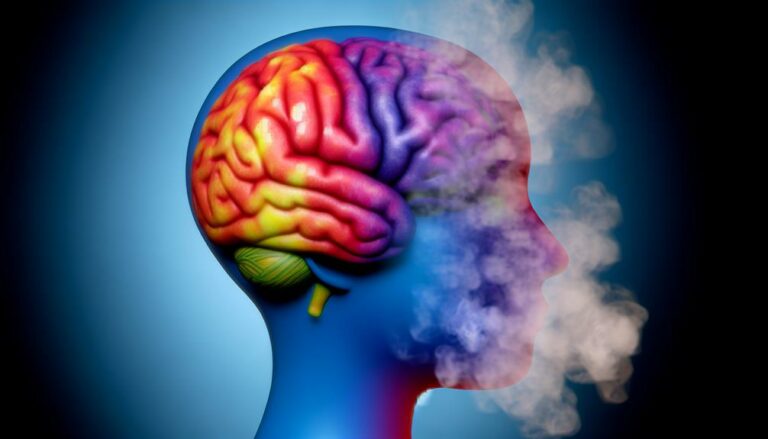Imagine this: studies suggest that individuals who use cannabis for an extended period are almost twice as likely to develop psychotic disorders compared to those who do not.
The implications of long-term cannabis use on mental health are complex and multifaceted. As you consider the potential impact on memory, cognitive function, anxiety, depression, and even motivation, a deeper understanding of the relationship between cannabis use and mental health outcomes is crucial.
Stay tuned to explore the latest research findings and insights that shed light on this intriguing connection.
Table of Contents
Research on Cannabis and Mental Health
When exploring the relationship between long-term cannabis use and mental health outcomes, it becomes crucial to delve into the extensive research that sheds light on this complex interplay.
Research has shown a significant association between long-term cannabis use and the development or exacerbation of mental health conditions such as anxiety and depression. Studies indicate that while some individuals may experience temporary relief from symptoms, prolonged use can lead to a higher likelihood of experiencing mental health issues.
Moreover, research has highlighted the impact of cannabis on the risk of psychosis, especially in vulnerable populations. Individuals with a predisposition to conditions like schizophrenia may face an increased risk of psychotic episodes with long-term cannabis use. Understanding these findings can help individuals make informed decisions about their cannabis consumption, especially if they’ve a history of mental health concerns.
RELATED ARTICLE: Chronic Cannabis Use: Mental Health Effects Explained
Impact on Memory and Cognitive Function
Long-term cannabis use poses potential risks to memory and cognitive function. Research indicates that memory impairment and cognitive decline are among the effects associated with prolonged cannabis consumption.
Understanding these risks is crucial in making informed decisions about cannabis use and its impact on mental health outcomes.
Memory Impairment Risks
Memory impairment risks associated with long-term cannabis use can significantly impact cognitive function, potentially leading to lasting consequences on mental health outcomes. Research suggests that cannabis can interfere with the hippocampus, a crucial brain region for memory formation. Chronic cannabis use may impair the ability to encode, store, and retrieve memories effectively, affecting both short-term and long-term memory.
These memory deficits can manifest in various ways, such as forgetfulness, difficulty concentrating, and impaired learning abilities. It’s essential to recognize these risks and consider the impact they may have on your daily life and overall well-being. Seeking support from healthcare professionals and exploring strategies to mitigate memory impairment are crucial steps in safeguarding your cognitive function and mental health.
Cognitive Decline Effects
Experiencing cognitive decline due to cannabis use can have profound effects on memory and cognitive function, impacting various aspects of daily life and overall well-being.
Long-term cannabis use has been linked to deficits in cognitive functions such as memory, attention, and executive functioning. Research suggests that heavy cannabis consumption, especially during adolescence when the brain is still developing, can lead to long-lasting impairments in cognitive abilities. Memory recall, learning new information, and decision-making processes may all be negatively affected.
These cognitive impairments can interfere with academic or work performance, relationships, and overall quality of life. It’s crucial to be aware of these potential consequences and consider seeking support or making changes to mitigate the impact of cannabis-related cognitive decline.
Association With Anxiety Disorders
If you’re a long-term cannabis user, understanding the prevalence rates of anxiety disorders is crucial. Anxiety can significantly impact your daily life, affecting relationships, work, and overall well-being.
Seeking appropriate treatment and management strategies is essential to address anxiety disorders effectively.
Anxiety Prevalence Rates
Among individuals with long-term cannabis use, there’s a notably heightened prevalence of anxiety disorders compared to non-users. This correlation is crucial to consider when evaluating the impact of cannabis on mental health. Understanding anxiety prevalence rates is key to providing comprehensive care and support for individuals using cannabis long-term.
- Individuals with long-term cannabis use may experience increased levels of generalized anxiety.
- Anxiety disorders such as panic disorder and social anxiety disorder are more common among long-term cannabis users.
- The relationship between cannabis use and anxiety disorders is complex and multifaceted.
- Early detection and appropriate interventions are essential in managing anxiety in individuals with long-term cannabis use.
Impact on Daily Life
Individuals with long-term cannabis use find themselves navigating daily life while grappling with the impact of anxiety disorders, which can significantly influence their overall well-being and quality of life. Anxiety disorders can manifest in various ways, such as excessive worry, fear, or panic attacks, making routine tasks challenging.
The constant feeling of unease and apprehension can lead to difficulties in concentration, decision-making, and social interactions. Simple activities like going to work, attending social gatherings, or even running errands may become overwhelming. The persistent presence of anxiety can also disrupt sleep patterns, appetite, and overall mood regulation.
These challenges can create a cycle where the individual’s anxiety further exacerbates due to the limitations it imposes on their daily life, affecting their overall mental health and well-being.
Treatment and Management
Navigating the treatment and management of anxiety disorders associated with long-term cannabis use requires a comprehensive approach that addresses both the psychological and physiological aspects of the condition. When dealing with anxiety disorders linked to cannabis use, it’s crucial to consider personalized treatment strategies tailored to your specific needs.
- Seek professional help from mental health professionals experienced in treating co-occurring disorders.
- Explore therapy options such as cognitive-behavioral therapy (CBT) to address underlying triggers and coping mechanisms.
- Consider lifestyle adjustments including regular exercise, adequate sleep, and a balanced diet to support overall well-being.
- Collaborate with your healthcare provider to monitor progress and adjust treatment plans as needed.
Relationship With Depression Symptoms
Long-term cannabis use has been significantly associated with fluctuations in depression symptoms over time, indicating a complex interplay between substance use and mental health. While some individuals may initially turn to cannabis as a way to alleviate feelings of sadness or low mood, research suggests that prolonged use can actually exacerbate depressive symptoms in the long run.
The relationship between cannabis and depression is multifaceted; cannabis use can impact neurotransmitter systems in the brain, such as serotonin and dopamine, which are closely linked to mood regulation.
Moreover, the method of cannabis consumption, frequency of use, and potency of the product can all influence its effects on depression symptoms. Individuals with pre-existing vulnerabilities to depression may be at a higher risk of experiencing worsened symptoms with long-term cannabis use.
Understanding these nuances is crucial in addressing the complex relationship between cannabis use and mental health outcomes, particularly regarding depression. If you’re experiencing depression symptoms and are using cannabis long-term, it’s advisable to seek professional guidance to explore the best course of action for your mental well-being.
Influence on Psychosis Development
Research indicates a significant association between cannabis use and its influence on the development of psychosis over time. While not everyone who uses cannabis will develop psychosis, long-term use has been linked to an increased risk of psychotic disorders. Here are some key points to consider:
- Increased Risk: Longitudinal studies have shown that individuals who use cannabis regularly are more likely to develop psychosis compared to non-users.
- Age of Onset: Cannabis use during adolescence, a critical period of brain development, may have a more pronounced impact on the risk of developing psychosis later in life.
- Genetic Vulnerability: Some individuals may have a genetic predisposition that interacts with cannabis use, further elevating their risk of experiencing psychotic symptoms.
- Dose-Response Relationship: Higher potency cannabis products and greater frequency of use have been associated with a dose-dependent increase in the likelihood of developing psychosis.
Understanding these factors can help individuals make informed decisions about cannabis use and mental health outcomes.
Effects on Motivation and Reward Processing
The impact of long-term cannabis use on motivation and reward processing is a critical aspect to consider in understanding its broader effects on mental health outcomes. Research suggests that chronic cannabis use can lead to alterations in the brain’s reward system, affecting motivation levels and how rewards are processed.
THC, the psychoactive compound in cannabis, can influence the release of dopamine in the brain, which plays a crucial role in motivation and reward processing.
Individuals who use cannabis long-term may experience decreased motivation, finding it challenging to engage in activities that they once found rewarding. This can impact various aspects of life, including work, relationships, and overall well-being. Additionally, changes in reward processing can lead to a decreased sense of pleasure from activities that were previously enjoyable, contributing to symptoms of anhedonia.
Understanding these effects on motivation and reward processing is essential in addressing the broader mental health implications of long-term cannabis use. By recognizing these challenges, you can take proactive steps to mitigate potential negative outcomes and seek appropriate support if needed.
Connection to Substance Use Disorders
When considering the impact of long-term cannabis use on mental health outcomes, the connection to substance use disorders becomes a crucial area of focus. Individuals who engage in extended cannabis use may be at a higher risk of developing substance use disorders, which can have detrimental effects on their overall well-being.
- Increased Vulnerability: Long-term cannabis use can increase your vulnerability to developing substance use disorders, leading to potential challenges in controlling substance intake.
- Biological Mechanisms: Cannabis use can affect the brain’s reward system, potentially influencing the development of addictive behaviors towards other substances.
- Co-Occurrence: Substance use disorders often co-occur with mental health conditions, highlighting the importance of addressing these interconnected issues simultaneously.
- Treatment Considerations: Understanding the link between cannabis use and substance use disorders is essential for informing effective treatment strategies that cater to individual needs.
Longitudinal Studies and Future Considerations
Considering the potential impact of long-term cannabis use on substance use disorders, exploring longitudinal studies and future considerations is imperative for gaining a deeper understanding of the long-term effects on mental health outcomes. Longitudinal studies tracking individuals over extended periods can provide valuable insights into how cannabis use patterns correlate with the development of mental health conditions. By following participants over time, researchers can observe how cannabis use influences the onset and progression of substance use disorders, anxiety, depression, and other mental health issues.
Future considerations in this area of research should focus on addressing gaps in current knowledge, such as the specific mechanisms through which cannabis use may contribute to different mental health outcomes. Additionally, exploring how factors like dosage, frequency of use, and method of consumption impact long-term mental health is crucial for developing targeted interventions and policies. By combining longitudinal studies with comprehensive future research efforts, we can pave the way for a more nuanced understanding of the complex relationship between long-term cannabis use and mental health outcomes.
Frequently Asked Questions
Can Long-Term Cannabis Use Have Different Mental Health Outcomes Based on the Method of Consumption (E.G. Smoking, Edibles, Vaping)?
When you consider long-term cannabis use, mental health outcomes can vary based on consumption methods like smoking, edibles, or vaping. Understanding these differences is crucial for making informed choices regarding your well-being.
Are There Any Specific Genetic Factors That May Make Individuals More Susceptible to Negative Mental Health Outcomes From Long-Term Cannabis Use?
When considering genetic factors that may impact susceptibility to negative mental health outcomes from long-term cannabis use, it’s important to delve into research on how specific genes can influence individual responses to cannabinoids and potential psychological effects.
How Does the Potency of the Cannabis Product Impact Its Effects on Mental Health Over Time?
Consider how the potency of your cannabis product affects your mental health long term. Higher potency may lead to increased risks. Stay informed and moderate usage to prioritize your well-being and mental health.
Are There Any Age-Related Differences in the Mental Health Outcomes of Long-Term Cannabis Use?
As you explore age-related differences in long-term cannabis use’s mental health outcomes, consider how developmental stages may impact vulnerability. Younger users may face heightened risks due to ongoing brain development, while older individuals might encounter distinct challenges related to existing mental health conditions.
Can Environmental Factors, Such as Stress or Trauma, Interact With Long-Term Cannabis Use to Exacerbate Mental Health Issues?
Environmental factors, like stress or trauma, can indeed interact with long-term cannabis use to worsen mental health issues. It’s crucial to consider these external influences when examining the impact of cannabis on mental well-being.
Conclusion
In conclusion, long-term cannabis use has been associated with various mental health outcomes, including impacts on memory, cognitive function, anxiety disorders, depression symptoms, psychosis development, motivation, reward processing, and substance use disorders.
It’s important to consider these findings in future research and treatment approaches for individuals using cannabis. Understanding the potential risks and benefits of cannabis use on mental health is crucial in promoting overall well-being and addressing any potential negative consequences.




